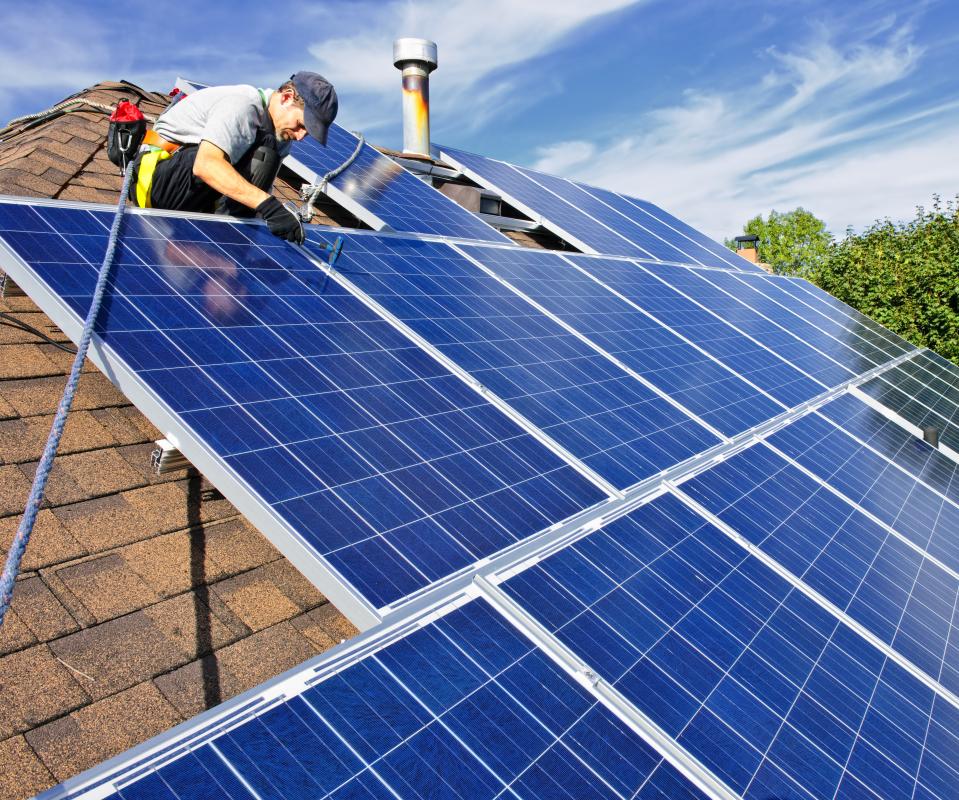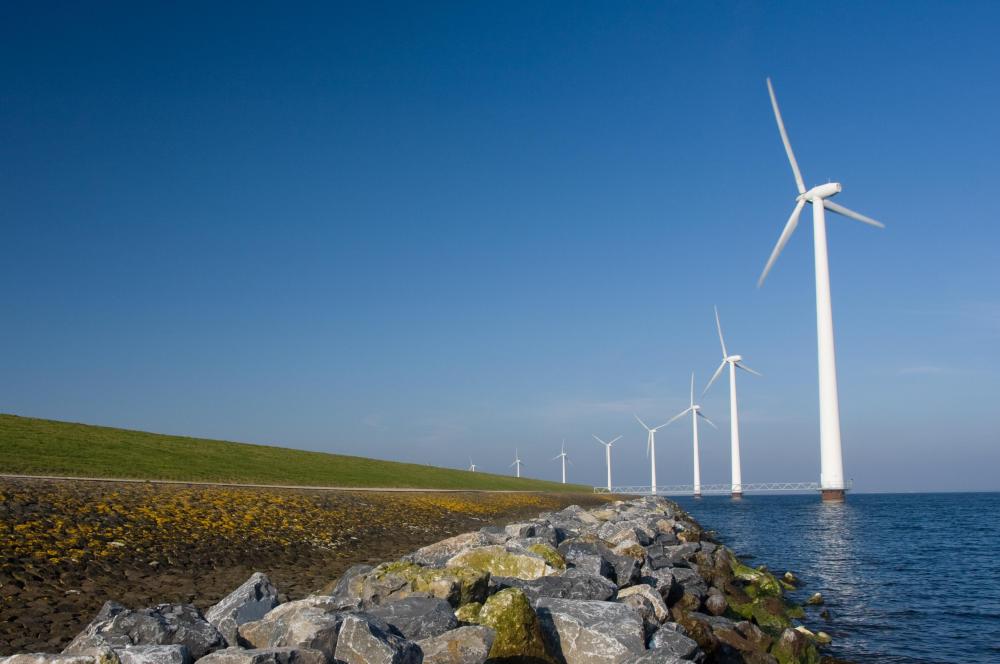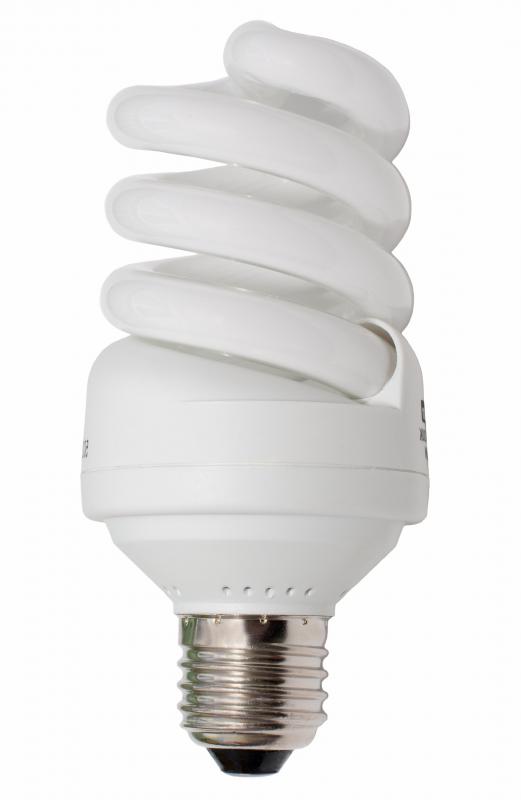At AllThingsNature, we're committed to delivering accurate, trustworthy information. Our expert-authored content is rigorously fact-checked and sourced from credible authorities. Discover how we uphold the highest standards in providing you with reliable knowledge.
What Is Electrical Energy Conservation?
Electrical energy conservation refers to the process of reducing energy used through various means. Many of these methods for reducing energy consumption can be undertaken at home; turning down the thermostat, turning off the lights when leaving the room, or switching off power strips when not in use are all examples of this. Homes, businesses or power companies making use of alternative clean energy sources, such as wind or solar energy, are also examples of electrical energy conservation. Many traditional electrical power plants are coal-fired, which contributes greenhouse gases to the atmosphere, contributing to climate change; this is just one reason that energy conservation is important.
For many people, electrical energy conservation begins at home. Not only is this good for the environment, but it can also significantly reduce the amount of a monthly electric bill. Some of the simplest steps to energy conservation include switching traditional light bulbs to compact fluorescent (CFL) bulbs, or turning the thermostat up in the summer and down in the winter. Making sure appliances are efficient, and that windows and doors are well sealed against the outdoors, are other examples of energy conservation. People looking for other opportunities for electrical energy conservation in the home should also look for power strips that can be switched off.

This type of energy use is sometimes referred to as "vampire energy," and refers to passive energy that is used when appliances are plugged in but not in use. For instance, televisions and computers still pull energy even when they are off. Plugging these items into a power strip, and switching it off at the source, can help to reduce or eliminate sources of this "vampire energy" in the home. Some people will go even further with resource conservation in their homes, and will install solar panels or geothermal systems to provide power, heating, and cooling to the home on a renewable, clean basis.

Electrical energy conservation takes place on the larger scale as well. The development and sale of clean, renewable energy from sources like wind turbines and larger solar farms is another example. Utility companies are often capable of developing this type of clean energy, but it is the responsibility of the consumer to get involved and demand it. Businesses can also take steps to ensure that they are having a low energy impact by purchasing power from these types of companies, if possible, or by teaching employees to switch off lights and computers when they leave at the end of the day.
Frequently Asked Questions
What is electrical energy conservation?

Electrical energy conservation refers to the practice of reducing the amount of electricity consumed by using energy more efficiently or by decreasing the overall consumption. This can be achieved through various means such as utilizing energy-efficient appliances, improving insulation in buildings, and encouraging behavioral changes to reduce waste.
Why is conserving electrical energy important?

Conserving electrical energy is crucial for several reasons. It reduces the strain on power plants, which can decrease pollution and greenhouse gas emissions, thereby mitigating climate change. According to the U.S. Energy Information Administration, the electric power sector accounted for about 32% of U.S. total greenhouse gas emissions in 2018. Additionally, it helps in conserving natural resources and can lead to significant cost savings for consumers.
How can households conserve electrical energy?
Households can conserve electrical energy by implementing simple measures such as switching to LED lighting, using programmable thermostats, unplugging devices when not in use, and opting for ENERGY STAR-rated appliances. The U.S. Department of Energy reports that LED bulbs use at least 75% less energy than incandescent lighting, making them a highly effective conservation measure.
What are the economic benefits of electrical energy conservation?
The economic benefits of electrical energy conservation include reduced utility bills for consumers and lower operational costs for businesses. Energy-efficient practices can lead to substantial savings; for instance, the U.S. Environmental Protection Agency estimates that ENERGY STAR appliances can save consumers 10-50% on their energy bills annually.
Can electrical energy conservation impact the national energy grid?
Yes, electrical energy conservation can have a significant impact on the national energy grid. By reducing peak demand, conservation efforts can lessen the need for additional power plants and infrastructure investments. This can lead to a more stable and reliable energy grid, as well as defer the costs of building new power generation facilities.
What role do renewable energy sources play in electrical energy conservation?
Renewable energy sources like solar, wind, and hydroelectric power play a pivotal role in electrical energy conservation. They provide clean, sustainable electricity that reduces dependence on fossil fuels. Integrating renewables into the grid helps in lowering carbon emissions and conserving finite resources, aligning with conservation goals. The International Energy Agency notes that renewables are set to account for almost 95% of the increase in global power capacity through 2026.
AS FEATURED ON:
AS FEATURED ON:














Discussion Comments
@Ana1234 - I'm sure one day all our energy needs will be met by renewable sources, but at the moment it's not completely feasible to just switch overnight. I don't know much about solar panels, but what I do know is that you need a lot of them in order to generate power and they will only work well in certain climates.
They are expensive, can be difficult to keep clean and are probably made with synthetic materials that aren't growing on trees. Changing to solar panel use across the board is going to take time and the same goes for every other kind of renewable energy resource.
In the meantime, people need to learn to conserve electrical energy. It wouldn't even be that hard for most households or businesses to do this. It's just a matter of providing proper incentives to encourage them to do so.
@Fa5t3r - Maybe in an ideal world we'd be able to get everyone to conserve the maximum amount of energy but I actually think what needs to be done realistically is for solar energy and other forms of renewable energy to be given more of a boost.
Solar panels should be routinely incorporated into every building design. If energy was cheap and widely available without consequences we wouldn't have to worry about it or how to convince people to conserve it.
Businesses are often ridiculously bad at energy conservation. I don't know why it became the norm to just switch of the screen of a computer without shutting it down, but what I do know is that my friends who work in computer support are always complaining about people at their workplaces who never allow the computers to update because they never turn them off.
Which is bad for the running of the computer, but even worse for the company, surely, since it means that the machine is running all the time and drawing energy all the time.
And that's just one area where electricity is being wasted. Honestly, if they were as quick to implement real resource saving techniques as they were to fire people the world would be a much better place.
Post your comments